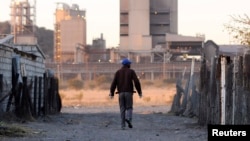The famous “Africa Rising” narrative appears to have hit a road bump, with the World Bank predicting in a new report that economic growth on the continent will slow to 3.7 percent this year -- the lowest level since 2009.
For decades, the continent’s economic fate has been tied to its wealth of raw materials -- commodities like oil, gas, gold and aluminum. While the continent is rich in such resources, very few African nations have succeeded in processing their bounty and profiting from it, choosing instead to export raw materials at much lower margins. That leaves countries like Angola and Nigeria -- two of the continent’s largest oil producers -- at the mercy of international commodity markets.
And that, said the bank’s vice president for Africa, Makhtar Diop, is exactly what has happened in the past year, as oil prices have slumped and resource-driven economies have suffered.
“Today’s external environment is changing,” he told journalists. “We have a slowdown of majority of economies in Africa, and the world. But also we have commodity prices that have been falling dramatically. That has been raising a certain number of challenges for African countries,” he said.
He also noted other factors, like China’s economic slowdown, the tightening of global financial conditions -- and African nations’ chronic problems with supplying enough electricity. In recent months, energy crises have all but crippled South Africa, a major economic power due to its mineral wealth.
But Martyn Davies, managing director of emerging markets and Africa at Johannesburg-based Deloitte Frontier Advisory, says the numbers are skewed by those large, resource rich economies. East African nations, which don’t have the benefit of massive deposits of oil, gas or minerals, are actually doing pretty well, he said.
The bank acknowledges that in its report, pointing out that countries not known as resource giants -- like Ethiopia, Ivory Coast, Mozambique, Rwanda and Tanzania -- are expected to see about 7 percent growth in the coming year.
Still, Davies notes, every nation should take heed and implement policies that promote stable long-term growth. One way to do that, he said, is to privatize moribund state industries -- a pill that might be politically difficult to swallow.
“This needs to be a wake-up call, countries in our region, amongst many other regions -- also think Latin America particularly -- have become drunk on overpriced commodities driven growth, Now we need to start to move away from that, be less complacent,” he said.
Economists have predicted that low oil prices will persist for some time, which means this slump could be a blessing in disguise, as African nations are forced to figure out how to escape the old narrative of being the world’s resource providers -- and truly rise on their own.




